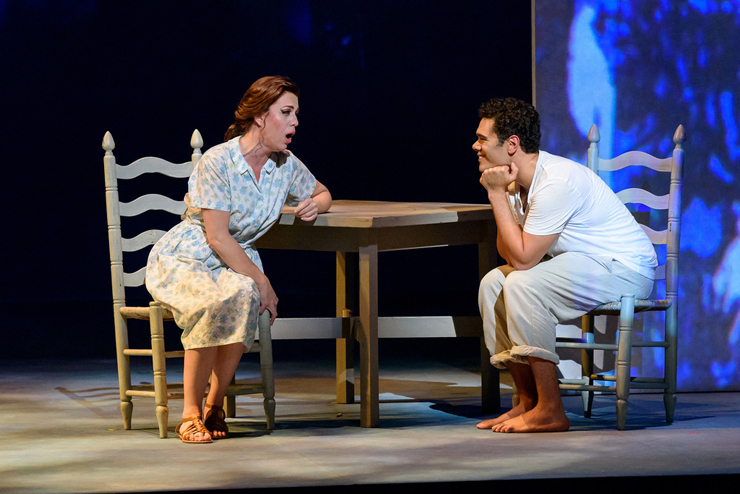
Mother (Elizabeth Caballero) and Reinaldo (Elliot Madore).
Photocredit: Chris Kakol.
Cuba, immigration, discrimination, sexual identity, free speech? Big enough?
And when the issues have the added advantage of also being current, the collision can be unsettling.
The audience at the Arsht Center on March 18 found Florida Grand Opera’s production of Jorge Martín's Before Night Falls tackling such searing issues.
Cuban poet, novelist and playwright Reinaldo Arenas’s posthumous 1992 memoir, “Before Night Falls,” surveys his life from childhood poverty in Cuba, to his persecution by the Castro regime for being a dissident writer and homosexual, his emigration to the United States in the 1980 Mariel boatlift, through to his final days of suffering from AIDS in New York City. After remaining on the New York Times best sellers list for 38 weeks, the book was adapted into a film of the same name in 2000 starring Javier Bardem and Johnny Depp. In 2010, Jorge Martín's opera adaptation of the book premiered at Fort Worth Opera.
FGO’s production is only the second mounting of the masque, and though hardly a work in progress, Martín was on hand to make a few tweaks.
Martín wrote the libretto, which tracks closely to Arenas’s book. Dolores M. Koch, who was a personal friend of Arenas, helped.
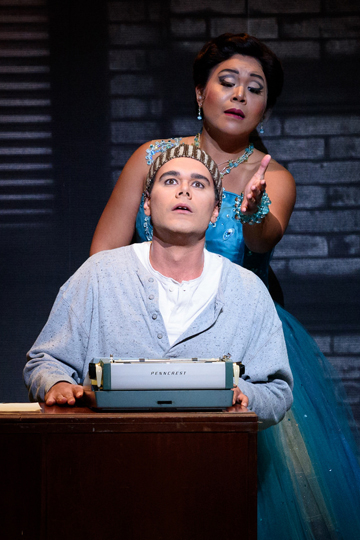
Reinaldo (Elliot Madore) and The Sea (Melissa Fajardo).
Photocredit: Chris Kakol.
It’s hard to imagine why this opera hasn’t acquired its legs yet. It has all the trappings of grand opera – a tragic hero. Betrayal, imprisonment, revenge, disease, a death scene – everything except a diva. (However, there are two lovely Muses.) The score soars while suddenly turning effectually intimate and idiomatic.
Jorge Martín, born in Santiago de Cuba, was educated at Yale College and Columbia University. He possesses the gift of orchestral finesse and melody that opera requires.
Martín’s music ranges and contrasts from lyrical to dramatic, charming to villainous, seething with melody and texture that is pleasingly percussive with Latin motifs and vaulting with a chorus in the richest of Italian traditions. In other words, there’s something here for every operatic taste.
The composer sees the opera as a series of escapes: from a repressive childhood village, from the oppressive Cuban regime, and ultimately from AIDS, from which there is no escape. The audience bears witness to the life of a man who is fraught with disillusion, betrayal, cruelty, torture and disease, a sobering reminder that we ain’t got it so bad. Drilling it down, perhaps it’s about every person’s need, besides following your calling, to love and be loved in return.
The characters are complicated and layered and the players for the most part fleshed them out effectively. Recitative and aria was fluid and continued to drive the story forward.
Casting a strong actor with a matching voice in the lead role of Rey (Reinaldo Arenas) isn’t enough: he must be good looking, charismatic, able to morph convincingly from a passionate young man into a physically and mentally broken spirit, capable of credibly clawing his way back to finishing an unfinished manuscript before he dies. As well, he must be a virile and attractive baritone rather than a heroic tenor.
Elliot Madore fit the bill.
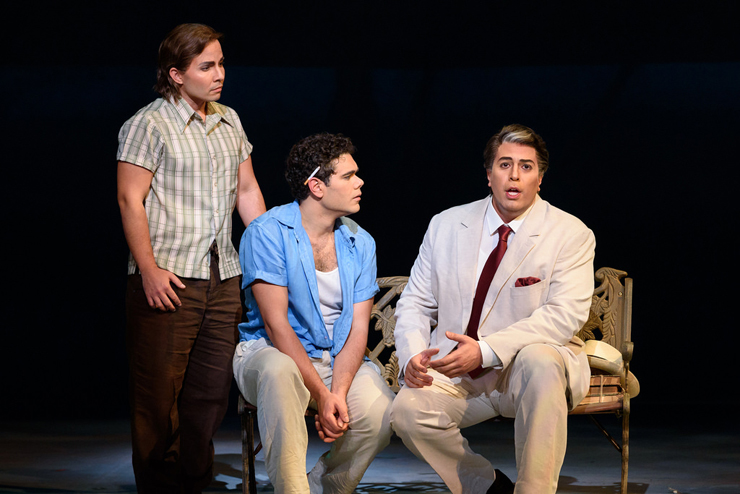
Pepe (Javier Abreu), Reinaldo (Elliot Madore), and Ovidio (Dinyar Vania).
Photocredit: Chris Kakol.
The tall, dark and well-built baritone was intense, firm on his feet with a demeanor expressing passion overtly and joy sparingly, sustaining his concentration and commitment to purpose over his 2-plus hours on stage. Vocally, Madore was both strong and lyrical, especially during the scenes where he implored his mentor Ovidio for “3 more years” in order to finish his memoir.
Inside a perfect square of light and darkness of solitary confinement (Harry Frehner’s crafty lighting design), Madore was loaded with feeling, caressing his Muses and his freedom, without which he cried: “I am no one, I am nothing!” Core- shaken after being forced to sign an official document labeling him a dissident (resigning his homosexuality and right to publish without consent), Madore delivered his arietta "So Now I am a 'Free' Man" with abundant heartbreak.
Madore’s pipes lit up and shook the house, reacting to Ovidio’s suicide, and lamented grievously at the opera’s conclusion upon realizing that Rey’s death sentence ironically came not from a tyrant, but from his lovers.
A physical actor, Madore played pain and playfulness with equal plausibility; he rose from his sickbed, wincing while losing his oversized shirt and skull cap for a tee shirt and rolled pants, singing “Poems, Poems” as he easily and nimbly stepped into the past with his childhood pals. During the disturbing rebel scene where a young man who allegedly committed treason was dragged onto the stage and assassinated by a firing squad in front of his weeping mother (soprano Laura León), Madore silently reacted with a wide range of gut emotion. Scenes where he was beaten were viscerally troubling.
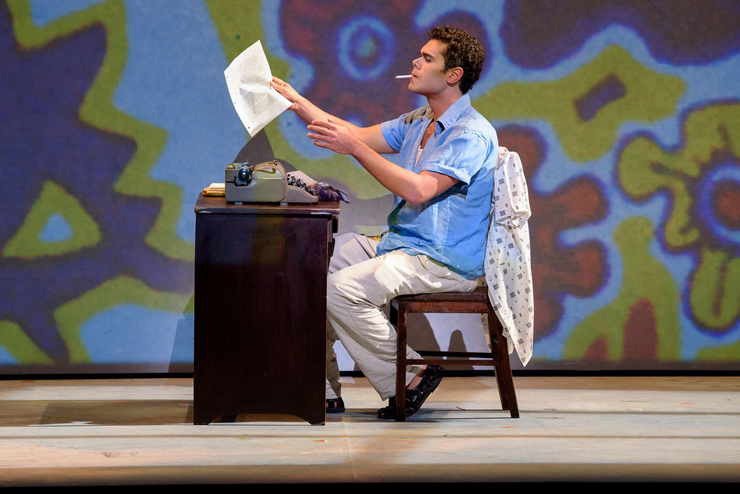
Reinaldo Arenas (Elliot Madore).
Photocredit: Chris Kakol.
Joining Madore on several pivotal scenes was Muscular and agile tenor Michael Kuhn, playing Lázaro, Rey’s supportive friend. After the dreamy overture intensified onto the opening sickbed scene, the chemistry between Madore and Kuhn was solid; Kuhn’s tenor was expressively flawless. His uplifting “I Got My Visa” at the Port of Mariel rolled into a duet with Madore, their baritone and tenor voices blending impeccably.
Equally as transformative was tenor Dinyar Vania playing the composite character Ovidio, dissident author and Rey’s mentor and confidant, moving believably from being the dapper-hatted, self-assured bon vivant to a shrunken cowering bare headed man, ostensibly betraying Rey, becoming the perfect suppliant in his final transformation, pleading for Rey’s forgiveness.
Vania, transfixed with an edgy tenor, brought the right amount of foreboding to "Reinaldo, Please--Not a Word," exhorting Rey to publish his writings underground; he heaped on the idea that “The truth is stronger than tyrants, stronger than darkness,” a line the Moon later repeated to Rey as he despairingly lamented the suicidal death of Ovidio. Vania’s mea culpa "But You, Reinaldo, Must Not Stay Silent," brought a similar intensity of voice and demeanor.
Slim bass-baritone Calvin Griffin, playing Víctor, rebel leader and prison officer, imbued his character with a disturbing calm, not requiring the strut of a lesser self-assured authority. With a red bandana around his neck and squared off beard and mustache reminiscent of Fidel Castro, he created an ominous presence standing on a crate looking down agreeably at the freshly assassinated peasant, and later, his well-articulated bass-baritone provided the creepiest of vibes as he dropped his lighter into a metal trashcan to watch Rey sob, and his intercepted manuscript, burn.
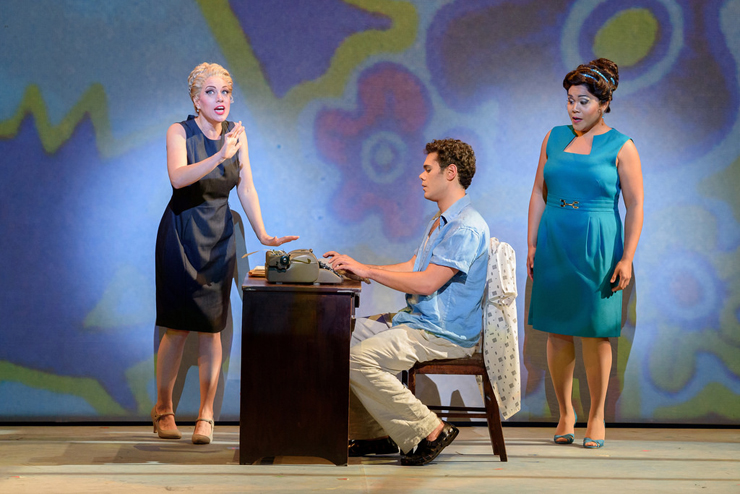
The Moon (Elizabeth Caballero), Reinaldo (Elliot Madore), and The Sea (Melissa Fajardo).
Photocredit: Chris Kakol.
Tenor Javier Abreu played Rey’s curly haired coquettish childhood friend Pepe (who betrayed Rey by turning over his manuscript to the authorities), and later became the aloof port official who forced Rey to do the “walk” – the cliché that would prove his homosexuality.
Versatile soprano Elizabeth Caballero inhabited both the characters of Rey’s mother and the Muse, the Moon. As mom, smoking a cigarette, she lolled like a rag doll, contrasting well with her Moon persona with her hair in a blond beehive – postured, cool and calm. As Rey insisted on joining Castro’s revolution, she implored him to keep the love of Cuba in his heart, rendering “Promise Me Child" with a voice naturally expansive and light, volubly soaring as the music rose optimistically.
Her dark hair pulled up in a matching beehive, mezzo soprano Melissa Fajardo, the Sea, was vocally strong but character flat; the sea can be calm, beguiling and mysterious, or angry, emotional and dangerous, certainly not colorless as depicted by Ms. Fajardo.
A clever bit of staging by director David Gately had The Muses putting on their trench coats, the Sea with a scarf, the Moon with a fedora, to surreptitiously smuggle out Rey’s newest manuscript, presumably for publication outside Cuba.
Caballero and Fajardo in duet did sound lovely, whether they were cajoling Rey to take to his typewriter, or warning him to misspell his name on his visa application to avoid being identified on the list of dissidents, or giving Rey his final send-off. The duo sang angelically as the scene shifted from Rey escaping from the Port of Mariel to New York City.
Just prior to Rey’s intentional overdose of drugs and alcohol that ended his haste to complete his memoir before he died – "before night falls" – he handed his completed manuscript to Lázaro with the instruction to “send it out into the world,” illuminating his struggle for his freedoms, personal, political and artistic.
Staging, lighting and music blended harmoniously as a bright but soft spotlight captured Rey’s bed and body juxtaposed to Lázaro, holding an urn, who sprinkled a fist full of ash that whispered to the ground; so too did the Muses sprinkle ash as they exited, the scene serene and soulful.
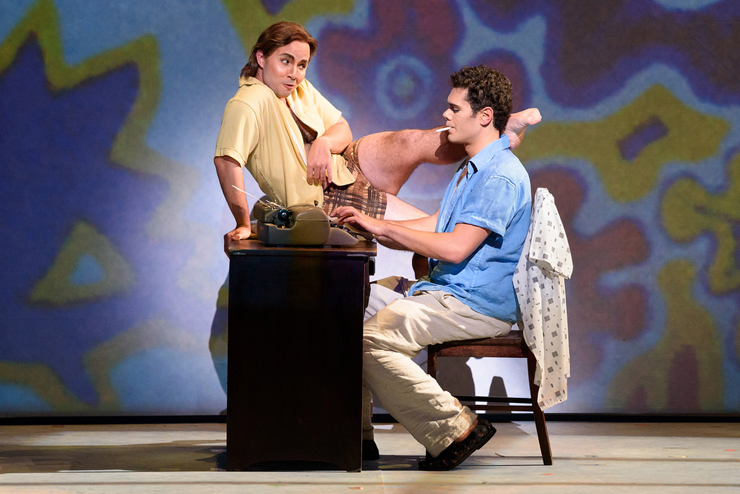
Pepe (Javier Abreu) and Reinaldo (Elliot Madore).
Photocredit: Chris Kakol.
Reliable chorus master Katherine Kozak prepped the chorus well – the stage filled with annoying aunts (might as well have been the insects!) singing irritatingly at Rey; the rebels raising their beers and singing the rousing “Victoria!” anthem; the large chorus of prisoners confined to El Morro Castle; the would be emigres outside the Peruvian Embassy; a beautiful a cappella choral hymn for Ovidio; a haunting marimba underscoring the chorus as Rey leaves on the boatlift.
Conductor Christopher Allen (who received huge applause as he entered the pit for Act 2) navigated the massive score handily; claves and maracas signaled mood and scene changes; recurring romantic melody and slow Latin refrains softened harder passages; brass, winds, strings, bells and percussion bloomed into a creative syncopation as Rey took his seat and began typing; a lovely instrumental infused with harp turned suddenly intrusive as officers dragged Rey off the beach to prison; the strings ascended urgently as Lázaro delivered the fatal cocktail.
Nuance resulted from unsettling music subtexting Rey’s defiance to Víctor’s interrogation; a solo violin joined a solo clarinet as Rey and Lázaro connected; a bass clarinet underscored Ovidio as he acknowledged his crime of betrayal.
The orchestra constantly filled up the sound pool, the richly layered score continuously supporting Rey’s enormous emotions.
Native son Riccardo Hernandez’s set design dispensed with most set pieces – save a chair here, a desk there, a trash can – and relied on accomplished Broadway projection designer Peter Nigrini’s “digital” setscape, consisting of scrims and 7 large movable panels on which over 200 digital images were projected. Panels flew up and down from the fly space and rolled on and off, transporting us from Rey’s apartment to Cuba’s tropical coastline, palm trees, beaches, and buildings in Havana, to a rebel camp and to the New York skyline. Communist propaganda posters also flashed onto the screens.
Claudia Stephens’s costumes included sleek and elegant dresses for the Muses in shades of grey, accented in silver and white shimmer; olive drab army uniforms for the rebels; aunt’s house dresses in pastel colors; colorful long fitted swim trunks for the boys on the beach. Harry Frehner’s lighting accented the crowd with orange, red, green and blue tinge.
A story which could have easily become trite and overblown, this one struck at honesty. The opera demanded a lot from the singers, the orchestra and the audience.
The crowd was enthusiastic with a five-minute standing-O.
Kudos to FGO for inserting this new work into its standard repertoire.
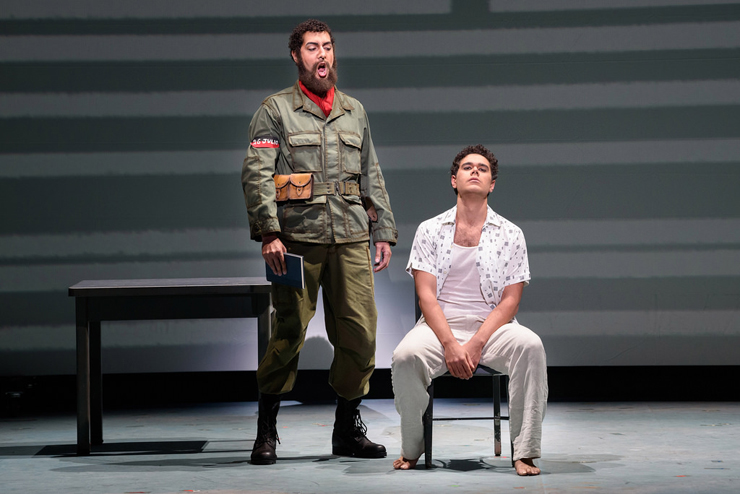
Víctor (Calvin Griffin) and Reinaldo (Elliot Madore).
Photocredit: Chris Kakol.
In his prescient suicide note, Arenas wrote: “I want to encourage the Cuban people living abroad, as well as on the island, to continue fighting for freedom. Cuba will be free. I already am.”
"Before Night Falls." By Jorge Martín; libretto by Jorge Martín and Dolores M. Koch; conductor, Christopher Allen; stage director, David Gately; production, Fort Worth Opera; sets by Riccardo Hernandez; lighting by Harry Frehner; projection design by Peter Nigrini; costumes by Claudia Stephens; wig and make-up by Sue Schaefer; chorus master, Katherine Kozak; assistant conductor, Lance Inouye; production stage manager, Liam Roche; FGO general director, Susan T. Danis; audio description by the Arsht Audio Description Volunteer Team.
Cast: Reinaldo Arenas - Elliot Madore, Ovidio - Dinyar Vania, Víctor - Calvin Griffin, Lázaro - Michael Kuhn, Pepe/Port/Visa Official - Javier Abreu, Mother/The Moon - Elizabeth Caballero, The Sea - Melissa Fajardo, Peasant's Mother - Laura León.
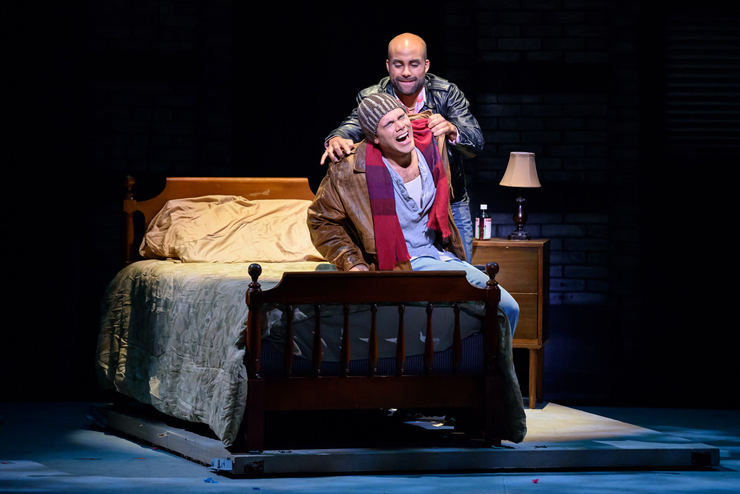
Reinaldo (Elliot Madore) and Lázaro (Michael Kuhn).
Photocredit: Chris Kakol.
Remaining schedule | "Before Night Falls" sung without amplification in English, with projected titles in English and Spanish. Miami Adrienne Arsht Center / Ziff Ballet Opera House March 24 and 25, 2017 at 8 p.m.
Ticket purchases can be made online at www.FGO.org, or by phone at FGO’s Box Office (800) 740-1010.




